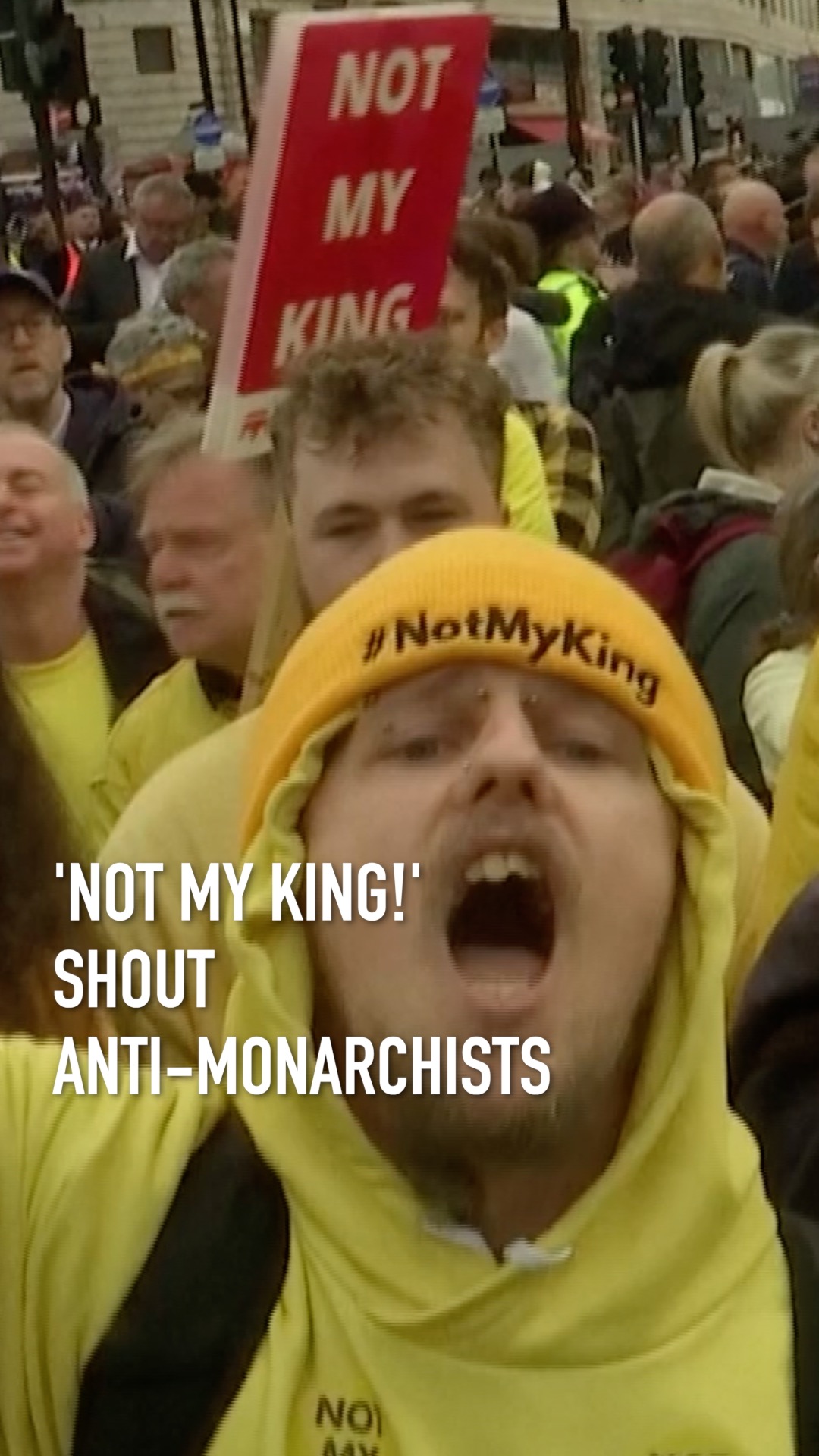
Police detain a protester on the day of the coronation in London. /Andrew Boyers/Reuters
Police detain a protester on the day of the coronation in London. /Andrew Boyers/Reuters
Anti-monarchy protesters were arrested in London on the day of King Charles' coronation, leading to questions about British people's freedom to protest and claims of an over-reaction from the UK capital's Metropolitan Police.
The leader of anti-monarchy group Republic and other members were released from custody after hours of detention during Saturday's coronation.
Police arrested the leader of Republic, Graham Smith, and 51 others in central London while thousands of royal fans were gathering in the streets, saying their duty to prevent disruption outweighed the group's right to protest.
Contentious new laws handing police increased powers to curb disruptive protests by climate campaigners and others came into force just last week, leading to accusations they were rushed through ahead of the coronation. Under the Public Order Act, protesters who block transport links could be jailed for 12 months, while those who lock themselves to objects could be imprisoned for six months and face an unlimited fine. Police also have the power to stop and search demonstrators who they think will cause trouble.
00:56

It strikes at the heart of people's liberties in the UK and has been opposed by the UN's human rights chief. United Nations High Commissioner for Human Rights, Volker Turk, said the legislation was "deeply troubling" and that it imposed restrictions on freedom of expression and peaceful assembly that are "neither necessary nor proportionate."
Turk said in a statement that the UK police "already have the powers to act against violent and disruptive demonstrations" and called on the government to reverse the legislation.
"I am also concerned that the law appears to target in particular peaceful actions used by those protesting about human rights and environmental issues," Turk said, adding that governments should be protecting peaceful protests on such important issues, "not hindering and blocking them."
The law was incompatible with the UK's international human rights obligations, Turk said.

A coach carrying Prince William and Kate at the Coronation rides past protesters. /Violeta Santos Moura/Reuters
A coach carrying Prince William and Kate at the Coronation rides past protesters. /Violeta Santos Moura/Reuters
"The right to protest is a fundamental part of our democracy but we must also protect the law-abiding majority's right to go about their daily lives," a spokesperson for Britain's interior ministry said. "The Public Order Bill ... will bring in new criminal offences and proper penalties for selfish, guerrilla protest tactics."
But warning letters sent to anti-monarchists planning protests ahead of the coronation by the Home Office’s Police Powers Unit were called "intimidatory."
Republic said that detained members began to be released late on Saturday evening, after nearly 16 hours in custody.
"I'm now out of the police station... Make no mistake. There is no longer a right to peaceful protest in the UK," Smith said on Twitter. "I have been told many times the monarch is there to defend our freedoms. Now our freedoms are under attack in his name."
The police said on Saturday that they understood public concern following the arrests, but said they acted after receiving information that protesters were determined to disrupt the coronation procession. London police chief Mark Rowley warned on Friday that officers would take action if protesters tried to "obstruct the enjoyment and celebration" of people, saying there would be a "very low tolerance" for disruption.

An anti-monarchy placard among fans of the royal family during the coronation. /Justin Tallis/Reuters
An anti-monarchy placard among fans of the royal family during the coronation. /Justin Tallis/Reuters
In a separate incident, there was a dispute after police arrested three people early on Saturday morning and seized a number of rape alarms. The police cited intelligence that there were plans to disrupt the procession with the alarms, but the local Westminster Council expressed concern that trained volunteers for a night safety scheme had been detained.
"We are deeply concerned by reports of our Night Stars volunteers being arrested overnight," local councillor Aicha Less said, adding the volunteers were being offered support. "We are working with the Metropolitan Police to establish exactly what happened."
READ MORE
Catalonia's drought devastates 'lost cause' reservoir
Italy's winter drought ravaging rivers and crops
2022, the year of extreme weather
It was also revealed that the police would use facial recognition technology to track potential troublemakers.
"The watch list will be focused on those whose attendance on Coronation Day would raise public protection concerns," the force said. That includes those wanted for offences or with outstanding arrest warrants, the statement added.
Civil liberties organisation Big Brother Watch hit out at the proposed use of what it branded an "authoritarian mass surveillance tool that turns the public into walking ID cards."
"This Orwellian technology ... has no place on the streets of Britain...," still less during the Coronation, its legal and policy officer Madeleine Stone said.
Tens of thousands of people turned out to catch a glimpse of the newly crowned King Charles and Queen Camilla, who rode in a state coach back to Buckingham Palace after Saturday's service at Westminster Abbey.
Not everyone who came to watch was there to cheer Charles, with hundreds of republicans booing and waving banners reading "Not My King."
Source(s): Reuters
,AFP